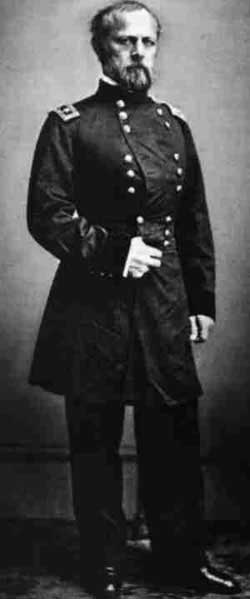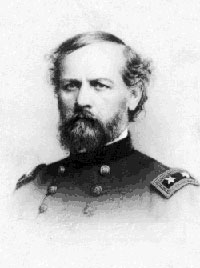
Don Carlos Buell
Don Carlos Buell was born March 23, 1818 in what is now Lowell, north of Marietta, Ohio; but spent most of his youth with an uncle in Lawrenceburg, Indiana, after his father died of cholera in 1823.
In 1837, he was appointed to West Point, graduating in 1841, 32nd in a class of 52. Following his graduation, he served with the 3rd Infantry in the Seminole and Mexican Wars.
 Wounded during the Mexican War, he received brevets of Captain and Major. He spent the next 13 years in the Adjutant Generalís office and was a Lieutenant Colonel working as an Adjutant of the Department of the Pacific when the American Civil War broke out.
Wounded during the Mexican War, he received brevets of Captain and Major. He spent the next 13 years in the Adjutant Generalís office and was a Lieutenant Colonel working as an Adjutant of the Department of the Pacific when the American Civil War broke out.
Buell was commissioned Brig. General on May 17, 1861; and in September, he assisted in organizing the Army of the Potomac under General George B. McClellan.
In November, he was transferred to Kentucky to succeed General Sherman as commander of the Army of the Ohio, said to be the most highly trained, successful, and modern army on both sides of the American Civil War.
He was expected to protect Louisville while simultaneously taking Nashville and liberating East Tennessee. Believing that he lacked sufficient forces to occupy all of Tennessee, he opted for Nashville, occupying it unopposed on February 25, 1862.
In the spring of 1862, he pursued the retreating Confederates under General Sydney Johnston toward Mississippi, and saved Grant at Shiloh, arriving with 30,000 fresh troops which turned the tide of the battle. In doing so, he embarrassed Grant.
Afterward, he served under General Henry Halleck during the Union advance on Corinth, after which he was sent to capture Chatanooga.
Burdened with the protection of hundreds of miles of railroad, and constantly harrassed by Confederate cavalry, he also contended with political interference, incurring the enmity of the governors of Indiana and Tennessee, who wanted control of their statesí volunteer forces.
A Democrat, he came into conflict with an increasingly radical Republican administration. While there were no serious doubts about his loyalty to the Union, the fact that he was a former slave owner left him open to charges that he was a Southern sympathizer.
In May of 1862, a Colonel under the command of General Buell permitted his soldiers to pillage the town of Athens, Alabama. The subsequent destruction infuriated Buell, who brought charges against Colonel Turchin for neglect of duty, conduct unbecoming an officer, and disobedience of orders. Turchin was convicted and sentenced to be dismissed from the army, yet was instead reinstated by the War Department and promoted to brigadier general.
President Lincoln ordered General Thomas to replace Buell on September 30, 1862. Thomas refused the command, and Lincoln suspended the order.
September 30, 1862. Thomas refused the command, and Lincoln suspended the order.
Pursuing the Confederates into Kentucky, Buell engaged in a battle at Perryville in October of 1862. Due to a breakdown in command and communications on both sides, only parts of both armies were engaged in actual fighting. The result nevertheless pushed Bragg back into Tennessee, bringing Kentucky under Union control.
Charged with a failure to pursue the retreating Confederates, he was relieved of his command on October 24, 1862.
For the next several months, Buell was subjected to appearing before military commissions, in which Buell claimed that he had failed to pursue the enemy because his troops were poorly supplied. The commissions reviewed the facts, yet made no recommendations.
Finally, Buell returned to Indianapolis to await orders that never came. He was mustered out of the army on May 23, 1864, resigning his commission on June 1st of that year.
After the war, Buell moved to Kentucky and became president of the Green River Iron Company.
He died in Rockport, Kentucky on November 19, 1898.